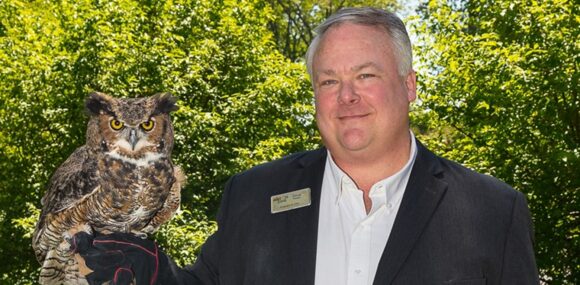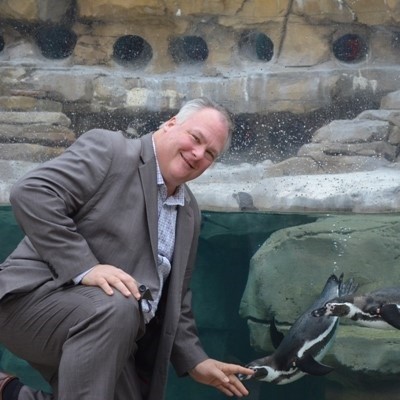
Alumnus Doug Piekarz. Photos courtesy of the Akron Zoo.
Rutgers alumnus Doug Piekarz has devoted his life to saving wildlife, wild places, and the world.
By Debbie Meyers
Doug Piekarz grew up spending holidays and weekends at his grandfather’s cabin nestled in the wilderness of upstate New York’s Catskill Mountains. His childhood love of nature led Piekarz (CC’89) to Rutgers University and ultimately to his life’s mission of connecting people to wildlife, inspiring lifelong learning, and moving people to conservation action. As president and CEO of the Akron Zoo in Ohio, he shares his story and philosophy on academic life, work life, and wildlife.
The Rutgers Landscape
When I came to visit Rutgers, I fell in love with it.
What appealed to me was this stately school (Cook College) in a rural environment. Ever since my grandfather sold his cabin, I felt like I’d been chasing a new cabin somewhere. The campus at Cook College was another place where I could enjoy that.
It was surrounded by nature. It was surrounded by animals. You had the early 1900s style buildings, but you still had Passion Puddle right in the middle of them. In between classes, you were in a park-like environment. And if you decided to go out in the back, you were in open fields, in woodlands, even going out into the middle of corn fields on the other side of the highway.
There were great opportunities to reenergize. I’m an introvert who learned how to “play an extrovert on TV” when needed. Recharging for me continues to come from sites like Cook Campus.

Doug Piekarz leads the Akron Zoo.
Intern vs. volunteer
I owe Rutgers for the career path I took. When I started, I thought I’d go down the road to laboratory animal science because I have a heavy analytical mind, like many introverts tend to. I had been talking to my major professors about making a difference for people and possibly getting into cancer research or something in the laboratory setting.
In my junior year, I was placed in that type of work. It was exactly what I thought I would go into, and I realized I absolutely hated it.
So I went back to the cooperative education office and looked at nonlaboratory setting opportunities. An exciting one was as a research assistant at the Bronx Zoo, working with their curator of horticulture to study plant animal interactions in their habitats. I thought, that’s really cool. The Bronx Zoo is the largest urban zoo in the country, so they had many great opportunities.
My advice: test drive the career you want to go into; don’t dare enter a career field without having interned in it. There is a big difference between volunteering in a career field and being paid as an intern or assistant. Volunteering in the field, you get the volunteer experience. When you are paid as a staff member you get the full experience.
The path that led to the zoo
That was the start of my career. I loved it. I flat out loved it every day. Even though I had to drive from Rutgers to the Bronx every day and cross the George Washington Bridge and sit in traffic, it was like a vacation to me. It was more than worth it.
What set me over the edge to move to Akron was Patricia Simmons, the first CEO of Akron Zoo. She said to me, at the close of my interview, that if I chose to come to Akron, I would help her build a zoo. It was an incredibly inspiring idea for my 20-something self!
The Akron Zoo felt like I was at my grandfather’s cabin again. That’s the same kind of gratification I felt when I set foot on Cook College and when I saw the Bronx Zoo for the first time. I got to build a new cabin over the next 34 years.
I could see my fingerprints, the desire to save the world coming to light with each project that opened, because for me, that’s what all of this is about. It’s about saving wildlife and wild places. It’s about saving this world, not just for the animal residents who share it with us, but for me, my kids, my grandkids, and this entire community.
And over time that desire moved from wanting to work directly with animals, which is where this began for me and where my career was established coming out of Rutgers, to the recognition that the place where I can make the biggest difference for wildlife was by working with people. To help folks make environmentally mindful decisions every day that address the root causes of species endangerment.
I’ve told all three of my kids, the number one thing to focus on is finding a career field that matches the mission on your heart. You can get a job or engage in a career to make a difference in the world! If you get a “J.O.B.,” you remain “Just Over Broke”—spiritually, physically, and financially for the rest of your life. If you engage in a career, your heart aligns with the work you’re doing and the worst day in a career is better than the best day in a job.
Internships played a key role in launching Doug Piekarz’s career. Please consider making a gift in support of the Rutgers Summer Service Initiative, which provides funding in support of public service opportunities for students.
What I Know Now is a series featuring alumni reflecting on their careers and their time at Rutgers.

